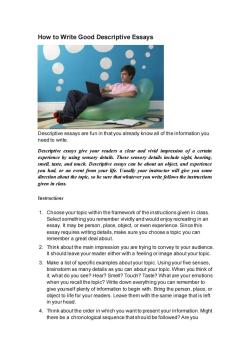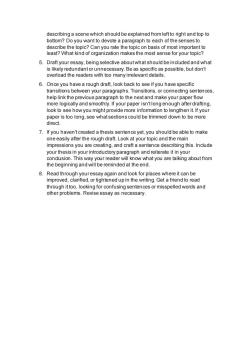《新编大学英语》综合教程(第三版第一册)B1U4_self-market_Writing Material_How to Write Good Descriptive Essays

How to Write Good Descriptive Essays Descriptive essays are fun in that you already know all of the information you need to write. Descriptive essays give your readers a clear and vivid impression of a certain experience by using sensory details.These sensory details include sight,hearing, smell,taste,and touch.Descriptive essays can be about an object,and experience you had,or an event from your life.Usually your instructor will give you some direction about the topic,so be sure that whatever you write follows the instructions given in class. Instructions 1.Choose your topic within the framework of the instructions given in class Select something you remember vividly and would enjoy recreating in an essay.It may be person,place,object,or even experience.Since this essay requires writing details,make sure you choose a topic you can remember a great deal about. 2.Think about the main impression you are trying to convey to your audience. It should leave your reader either with a feeling or image about your topic. 3.Make a list of specific examples about your topic.Using your five senses, brainstorm as many details as you can about your topic.When you think of it,what do you see?Hear?Smell?Touch?Taste?What are your emotions when you recall the topic?Write down everything you can remember to give yourself plenty of information to begin with.Bring the person,place,or object to life for your readers.Leave them with the same image that is left in yourhead 4.Think about the order in which you want to present your information.Might there be a chronological sequence that should be followed?Are you
How to Write Good Descriptive Essays Descriptive essays are fun in that you already know all of the information you need to write. Descriptive essays give your readers a clear and vivid impression of a certain experience by using sensory details. These sensory details include sight, hearing, smell, taste, and touch. Descriptive essays can be about an object, and experience you had, or an event from your life. Usually your instructor will give you some direction about the topic, so be sure that whatever you write follows the instructions given in class. Instructions 1. Choose your topic within the framework of the instructions given in class. Select something you remember vividly and would enjoy recreating in an essay. It may be person, place, object, or even experience. Since this essay requires writing details, make sure you choose a topic you can remember a great deal about. 2. Think about the main impression you are trying to convey to your audience. It should leave your reader either with a feeling or image about your topic. 3. Make a list of specific examples about your topic. Using your five senses, brainstorm as many details as you can about your topic. When you think of it, what do you see? Hear? Smell? Touch? Taste? What are your emotions when you recall the topic? Write down everything you can remember to give yourself plenty of information to begin with. Bring the person, place, or object to life for your readers. Leave them with the same image that is left in your head. 4. Think about the order in which you want to present your information. Might there be a chronological sequence that should be followed? Are you

describing a scene which should be explained from left to right and top to bottom?Do you want to devote a paragraph to each of the senses to describe the topic?Can you rate the topic on basis of most important to least?What kind of organization makes the most sense for your topic? 5.Draft your essay,being selective aboutwhat should be included and what is likely redundant or unnecessary.Be as specific as possible,but don't overload the readers with too many irrelevant details. 6. Once you have a rough draft,look back to see if you have specific transitions between your paragraphs.Transitions,or connecting sentences, help link the previous paragraph to the next and make your paper flow more logically and smoothly.If your paper isn'tlong enough after drafting, look to see how you might provide more information to lengthen it.If your paper is too long,see what sections could be trimmed down to be more direct. 7.If you haven't created a thesis sentence yet,you should be able to make one easily after the rough draft.Look at your topic and the main impressions you are creating,and craft a sentence describing this.Include your thesis in your introductory paragraph and reiterate it in your conclusion.This way your reader will know what you are talking about from the beginning and will be reminded at the end. 8.Read through youressay again and look for places where it can be improved,clarified,or tightened up in the writing.Get a friend to read through it too,looking for confusing sentences or misspelled words and other problems.Revise essay as necessary
describing a scene which should be explained from left to right and top to bottom? Do you want to devote a paragraph to each of the senses to describe the topic? Can you rate the topic on basis of most important to least? What kind of organization makes the most sense for your topic? 5. Draft your essay, being selective about what should be included and what is likely redundant or unnecessary. Be as specific as possible, but don't overload the readers with too many irrelevant details. 6. Once you have a rough draft, look back to see if you have specific transitions between your paragraphs. Transitions, or connecting sentences, help link the previous paragraph to the next and make your paper flow more logically and smoothly. If your paper isn't long enough after drafting, look to see how you might provide more information to lengthen it. If your paper is too long, see what sections could be trimmed down to be more direct. 7. If you haven't created a thesis sentence yet, you should be able to make one easily after the rough draft. Look at your topic and the main impressions you are creating, and craft a sentence describing this. Include your thesis in your introductory paragraph and reiterate it in your conclusion. This way your reader will know what you are talking about from the beginning and will be reminded at the end. 8. Read through your essay again and look for places where it can be improved, clarified, or tightened up in the writing. Get a friend to read through it too, looking for confusing sentences or misspelled words and other problems. Revise essay as necessary
按次数下载不扣除下载券;
注册用户24小时内重复下载只扣除一次;
顺序:VIP每日次数-->可用次数-->下载券;
- 《新编大学英语》综合教程(第三版第一册)B1U4_self-market_Samples_Read by Critical Thinking Before Reading.doc
- 《新编大学英语》综合教程(第三版第一册)B1U4_self-market_Samples_Activate Task Three.doc
- 《新编大学英语》综合教程(第三版第一册)B1U4_self-market_Reading Material_第4单元课文背景材料.doc
- 《新编大学英语》综合教程(第三版第一册)B1U4_self-market_Reading Material_第4单元 课文翻译及课后练习答案.doc
- 《新编大学英语》综合教程(第三版第一册)B1U4_self-market_Reading Material_演讲稿 My University Life.doc
- 《新编大学英语》综合教程(第三版第一册)B1U4_self-market_Reading Material_演讲稿 My Expectation of University.doc
- 《新编大学英语》综合教程(第三版第一册)B1U4_self-market_Reading Material_President’s welcome.doc
- 《新编大学英语》综合教程(第三版第一册)B1U4_self-market_Grammar and Vocabulary.doc
- 《新编大学英语》综合教程(第三版第一册)B1U4_self-market_B1U04 QUIZ_B1U04 Written Quiz.doc
- 《新编大学英语》综合教程(第三版第一册)B1U4_self-market_B1U04 QUIZ_B1U04 Oral Quiz.ppt
- 《新编大学英语》综合教程(第三版第一册)B1U4_Read by critical thinking.ppt
- 《新编大学英语》综合教程(第三版第一册)B1U4_Menu.ppt
- 《新编大学英语》综合教程(第三版第一册)B1U4_Do it or not, never say I will try.doc
- 《新编大学英语》综合教程(第三版第一册)B1U4_Activate.ppt
- 《新编大学英语》综合教程(第三版第一册)B1U3_U3 Translation & Writing.ppt
- 《新编大学英语》综合教程(第三版第一册)B1U3_U3 Read by critical thinking.ppt
- 《新编大学英语》综合教程(第三版第一册)B1U3_U3 Menu.ppt
- 《新编大学英语》综合教程(第三版第一册)B1U3_U3 Activate.ppt
- 《新编大学英语》综合教程(第三版第一册)B1U3_self-market_Writing Material_How to Give Advice.doc
- 《新编大学英语》综合教程(第三版第一册)B1U3_self-market_Writing Material_How to Get Rid Of Nervousness.doc
- 《新编大学英语》综合教程(第三版第一册)B1U4_Translation & Writing.ppt
- 《新编大学英语》综合教程(第三版第一册)B1U5 Activate.ppt
- 《新编大学英语》综合教程(第三版第一册)B1U5 Menu.ppt
- 《新编大学英语》综合教程(第三版第一册)B1U5 Read by critical thinking.ppt
- 《新编大学英语》综合教程(第三版第一册)B1U5 Translation & Writing.ppt
- 《新编大学英语》综合教程(第三版第一册)B1U5_Self-market_B1U05 QUIZ_Quiz05.docx
- 《新编大学英语》综合教程(第三版第一册)B1U5_Self-market_Listening Material_Transcript.docx
- 《新编大学英语》综合教程(第三版第一册)B1U5_Self-market_Reading Material_20个用以描述动物的形容词.docx
- 《新编大学英语》综合教程(第三版第一册)B1U5_Self-market_Reading Material_Do animals think.docx
- 《新编大学英语》综合教程(第三版第一册)B1U5_Self-market_Reading Material_Spirit Bear.docx
- 《新编大学英语》综合教程(第三版第一册)B1U5_Self-market_Reading Material_动物习语趣谈.docx
- 《新编大学英语》综合教程(第三版第一册)B1U5_Self-market_Samples.docx
- 《新编大学英语》综合教程(第三版第一册)B1U5_Self-market_Writing Material_推展段落方法之——描述法.docx
- 《新编大学英语》综合教程(第三版第一册)B1U6 Activate.ppt
- 《新编大学英语》综合教程(第三版第一册)B1U6 Menu.ppt
- 《新编大学英语》综合教程(第三版第一册)B1U6 Read by critical thinking.ppt
- 《新编大学英语》综合教程(第三版第一册)B1U6 Translation & Writing.ppt
- 《新编大学英语》综合教程(第三版第一册)B1U6_Self-market_B1U06 QUIZ_Quiz06.docx
- 《新编大学英语》综合教程(第三版第一册)B1U6_Self-market_Listening Material_Transcript.docx
- 《新编大学英语》综合教程(第三版第一册)B1U6_Self-market_Reading Material_The Mysterious Calm before the Storm.docx
